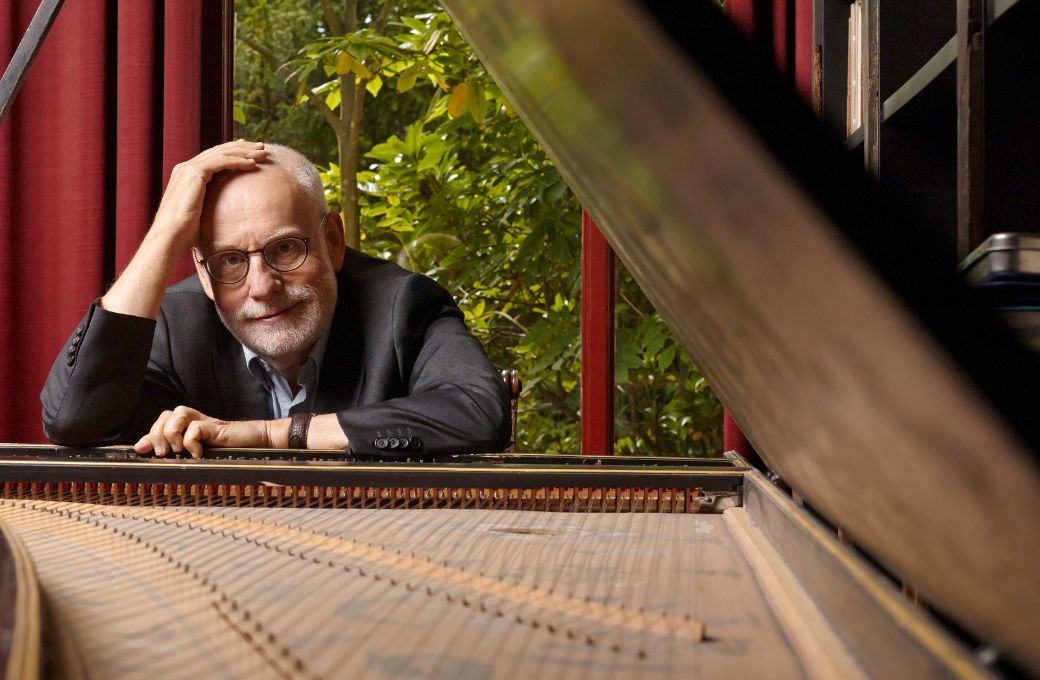Ton Koopman first discovered the music of Johann Sebastian Bach as a six-year-old singing in a boys’ choir. Ever since, the composer’s music has been at the centre of his musical life. Koopman’s lifelong discovery of Bach continues as a conductor, harpsichordist, organist, composer, and since 2019, the President of the Leipzig Bach Archive. Seven decades later, I ask if he feels closer to Bach as a person?

“I have certainly become more intimate with him over the years. That’s very clear to me. When I was younger, I always used to be afraid of the great master. I used to think: did I do something wrong? Now, with so much experience of performing Bach’s music, I’m a little less afraid. Anyway, there are times you have no obvious solution, because Bach didn’t write down exactly what he wanted – in performance you have to take a decision and try to do the best you can. The more you perform Bach, the more the missing information is filled in. And that’s a great thing.”
Koopman has also filled in missing information by reconstructing a number of Bach’s works where sources have been lost. For example, in one cantata performed the Leipzig Bachfest in June, Koopman had to reconstruct an entire missing violin part. Having studied both organ and composition, he says he can understand Bach from the viewpoint of a performer and as a composer – which are not always the same.
“When I first started to reconstruct, I felt like a little kid next to such a great musician as Bach; but then somebody has to do it, and it takes creativity as well. At next year’s Bachfest, we will perform another cantata, BWV192, which I reconstructed. I first did it for my recording of Bach’s complete cantatas, but I will look again with the knowledge I have now and see if I want to change things. After all, I am a musician who is in love with his work, but I’m not Bach, so I have to change things as well and improve things!”
It’s this non-reverential attitude to Bach’s music that marks Koopman out from the other early music performers of his generation. He makes Bach’s music friendlier, and brings it closer to listeners. He thinks of Bach as a “normal believer” – neither a puritan or fundamentalist – and that perhaps we shouldn’t be too reverential. I ask him to elaborate on this topic.
“I mean, in Bach’s time, if you were not a normal believer, you could not live! You were an outcast. You had to be somebody who believes in God. You had to go to Holy Communion. But Bach didn’t do that more than any other normal person. To make him out as a Fifth Evangelist is going too far.
“It’s a pity he was never an opera composer, as he could write so wittily, and with such a feeling for drama, and a feeling of what you can make of a personality. For example, in his secular cantata Der Streit der Phoebus und Pan (“The Contest between Phoebus and Pan”), there is a real psychologist working there. And stylistically, the arias are not so different in the secular cantatas as in the church cantatas.”
Koopman also wishes to draw a distinction between the youthful Bach and late Bach – a distinction not often emphasised in concert programming, given the lack of secure dates for many of the composer’s works. “When Bach was twenty years old and when he was sixty-five, he was a completely different person. I think you have to show that evolution. We know that when he was fifty-four, he could play the organ pedals with his feet quicker than some could play the manuals with their fingers! That doesn’t tell us anything about the metronome, but it tells us that he was a great virtuoso even later in life.”
“When I do a concert, I always try not to show only one Bach, but many different Bachs,” Koopman tells me. “Bach liked variety. And I think we do him a good favour by enjoying this variety.” This is very much the thinking behind his all-Bach concert at LuganoMusica in October [2023]. It’s a programme that combines the intellectual, the virtuosic, and the beautiful in Bach’s music. In the first half, Koopman and members of the Amsterdam Baroque Orchestra will perform the complete Musical Offering, a late masterpiece which is not often heard in concert. After the interval, they will perform Bach’s Concerto for Two Harpsichords BWV 1062 (Bach’s own arrangement of the concerto for two violins), preceded by a beautiful Sinfonia from his secular cantata BWV 209 with an Italian text – perhaps a gesture to the Italian-speaking city of Lugano.
As is widely known, the genesis for the Musical Offering came about when Bach visited his son Carl Philipp Emanuel Bach at the court of Frederick the Great, King of Prussia, in 1747. “Frederick was a flute player and a very artistic person, and knowing that Bach could improvise, he gave him a theme, what is now called ‘Royal Theme’, the theme of the Musical Offering,” explains Koopman. “And Bach improvised on that and then made a composition which he gave to the King… the Ricercar, in three parts, with a lot of chromatics. You could say it’s a simple fugue on the theme.” It’s thought that this three-part fugue is largely a transcription of Bach’s initial improvisation.
“Meanwhile, the Ricercar a 6, which we will play with the ensemble, is also full of ideas.” (Some musicologists speculate that the complex six-part fugue, as well as the Offering’s ten “riddle” canons, make reference to the Ten Commandments.) “Then there is this beautiful trio sonata, which is written in a totally different style. If we had found the score with only the name Bach on it, we would have thought it was composed by CPE Bach and not by his father, because the father is really imitating the style of his sons in the most superb way.”
Why is this masterpiece not more often performed in concert? “I think people have always said The Art of Fugue and the Musical Offering are works to read, but not to listen to. But I think they are just works to listen to,” he insists. “I think it’s such a good piece where you will find, at least in my way, intellectual parts next to more open parts, more open things to listen to that will touch the audience’s hearts.”
As the doyen of the early music world – although there is nothing authoritarian about him – how does Koopman see the general condition of the early music scene today, and is he optimistic about its future? “Well, I’m an optimist in life. I think, of course, the level of technical playing has improved a lot. When I started out in the 1960s and 70s, there was only one person who could play the Baroque oboe. Now there are many first-class Baroque oboe players.”
“When I started,” Koopman says, “our teachers Gustav Leonhardt and Nikolaus Harnoncourt were all trying to find a way. We were all looking for the right performance practice: how should we do this, how is it with this articulation? We were doing the research and trying things out. That’s important, and that’s something which is forgotten now by the newer generation. They should find what is attractive for them in early music, to see if they can defend their way of playing or singing. Which sources are there? There are so many that are still unknown. Our generation discovered many sources, but not too many new, special sources have been discovered in recent years. And I think that for the health of early music, it’s important that there are always new discoveries, and that the next generation is responding to, and checking what our generation did. I hope we did some good things, but we certainly made some mistakes as well. So check us! Maybe don’t be too nasty to us – we tried our best.”
Finally, Koopman says, “I hope that after me, the newer generation taking over will say: I really want to know, I really want to understand this music. Then I think it will be good for Bach”. Well, surely it’s too early to talk of a takeover. Let us enjoy Koopman’s vivacious music-making a little longer.
This article was sponsored by Fondazione LuganoMusica.


